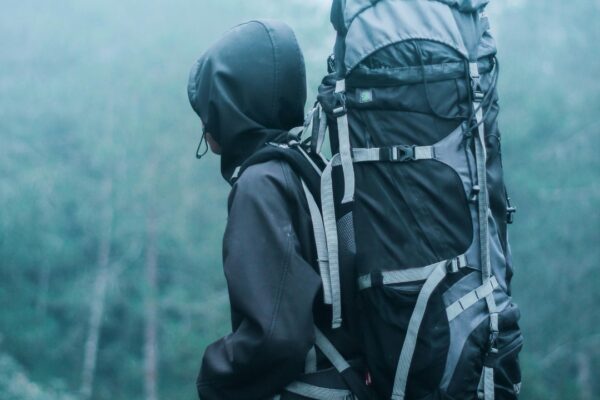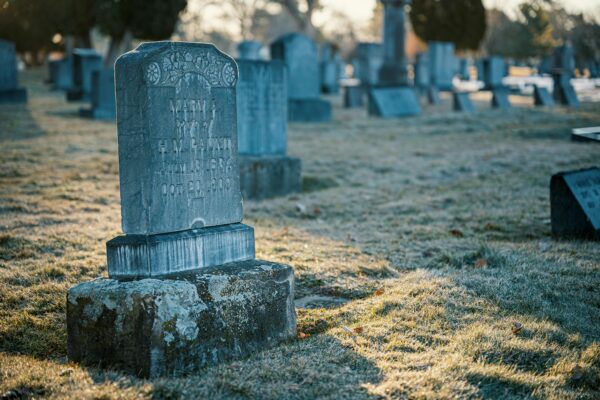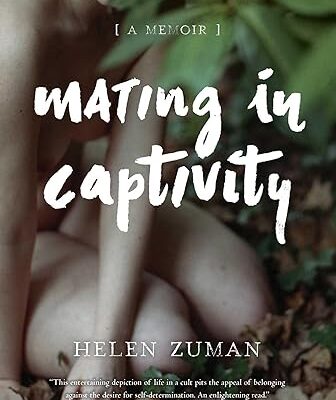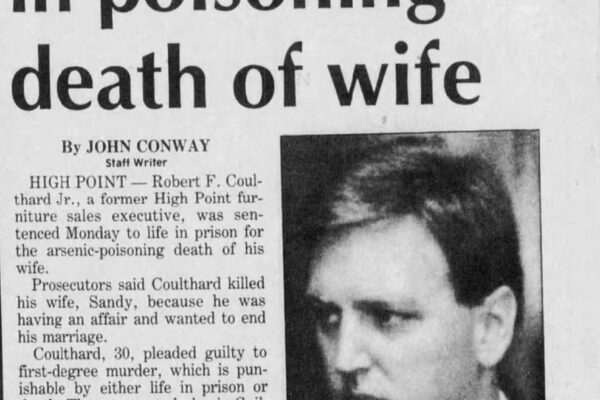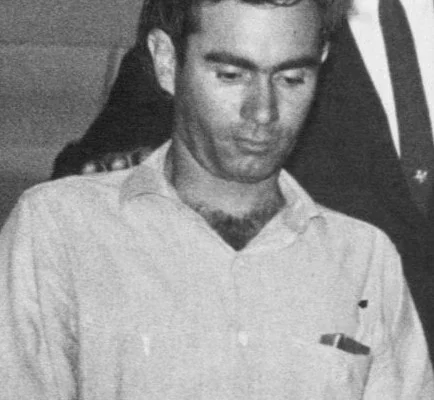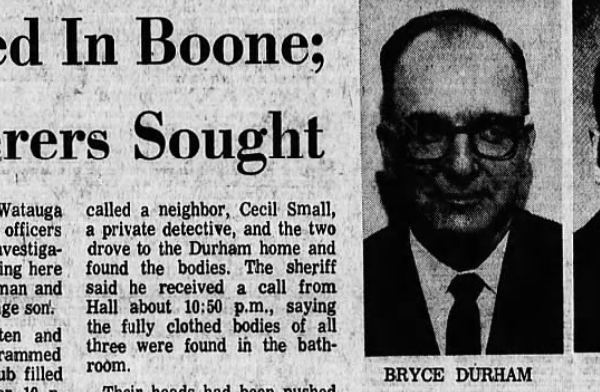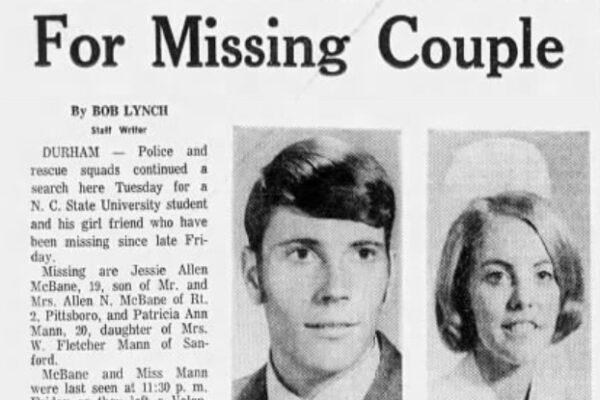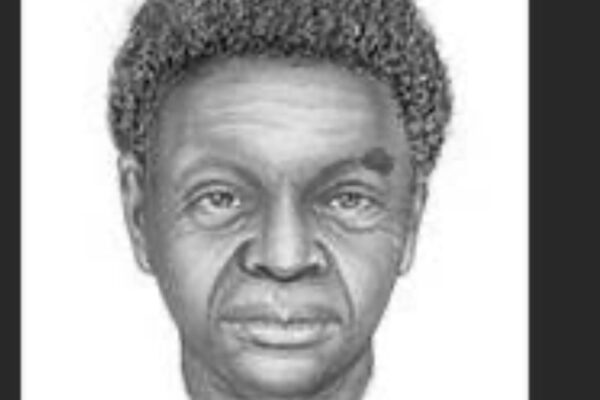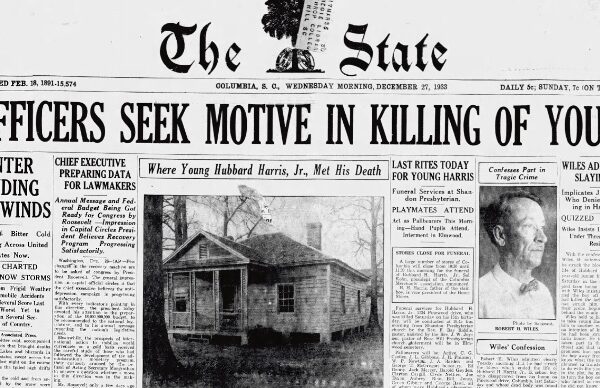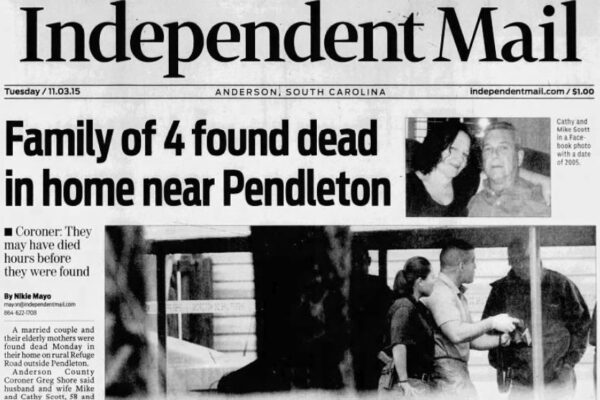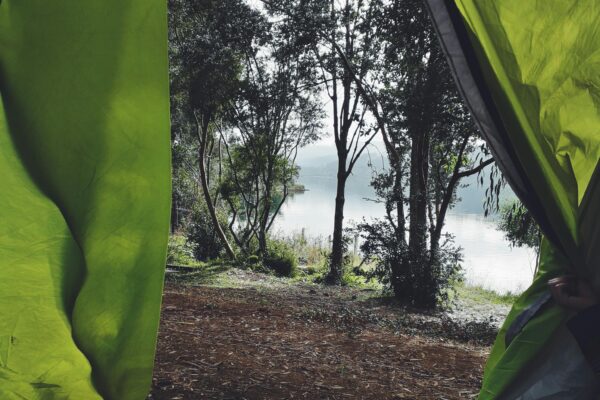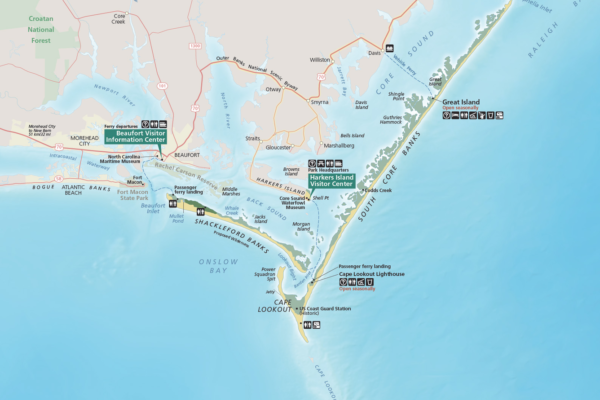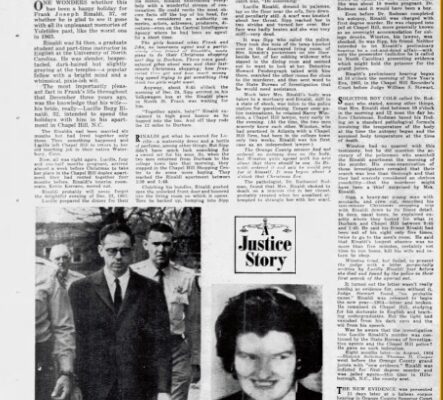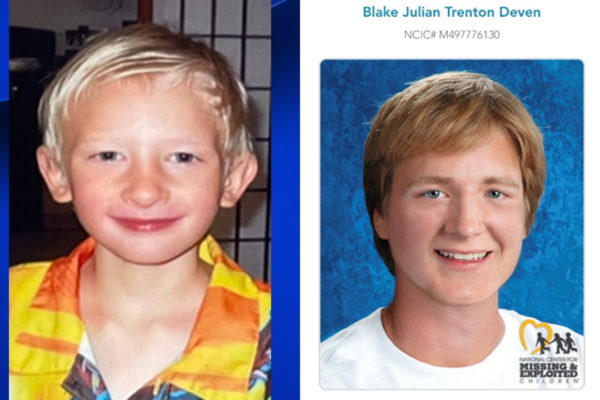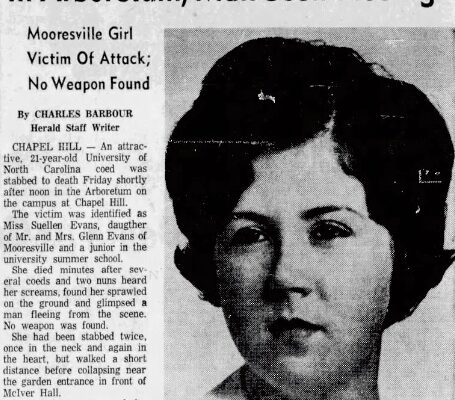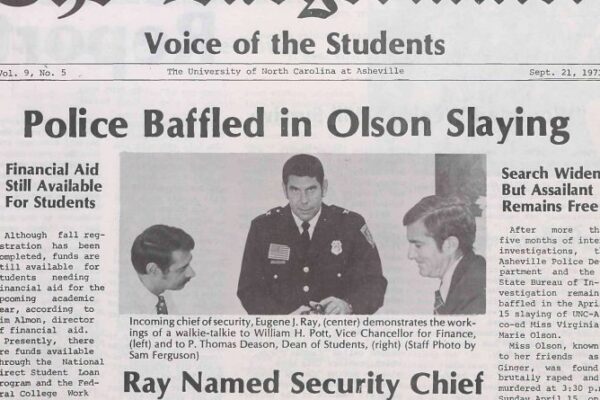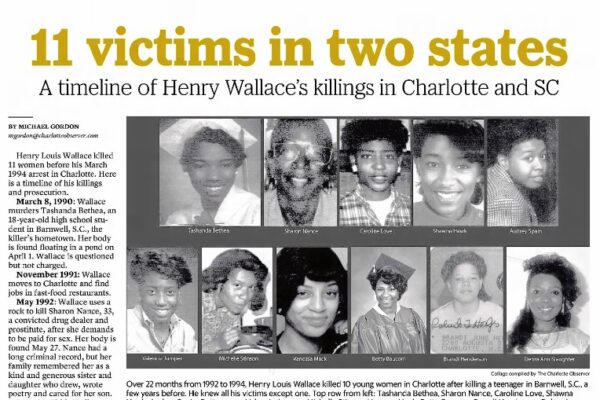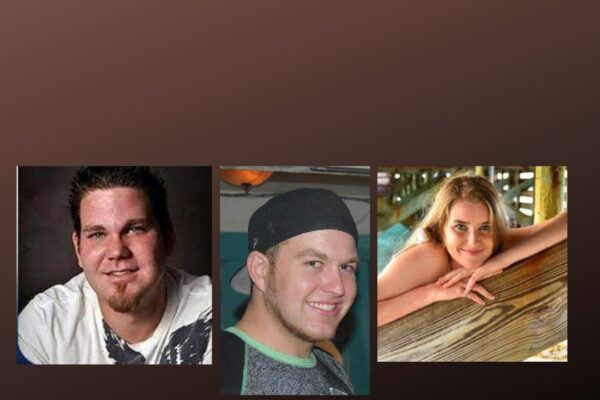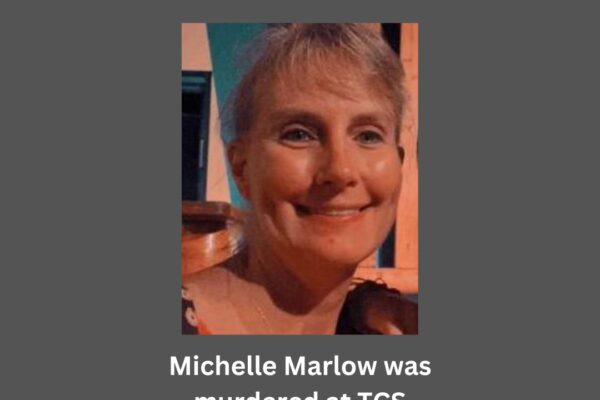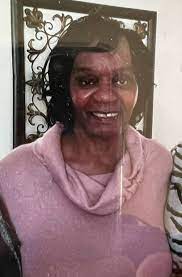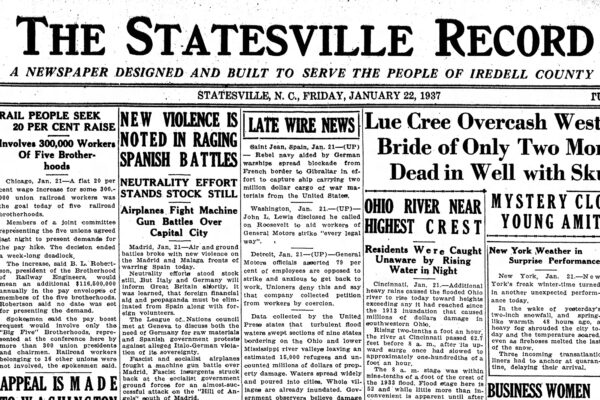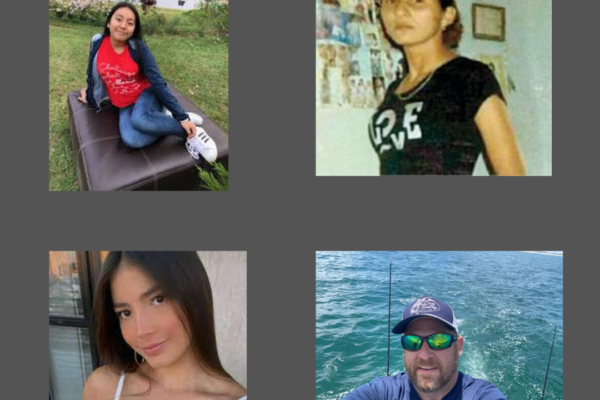On November 10, 2014, a 17-year-old young man named Alec Lansing went missing after he left a group from Trails Carolina, an organization in Western North Carolina that offers wilderness therapy for young adults and children. At the time, Alec, who was from Atlanta, Georgia, had been camping with a group off NC 107 in the forest near Heady Mountain Church Road. A search for Alec involved the U.S. Forest Service, the North Carolina Highway Patrol, the local sheriff’s office, the Glenville-Cashiers Rescue Squad, Jackson County Emergency Management and Cashiers Fire Department. Authorities had received reports that Alex was seen at a gas station in Cashiers on the evening he went missing from the group, but because of technical issues with the store video, they were unable to confirm that a young man matching Alec’s description was actually in the store.
On November 15, 2014, an article in The Asheville Citizen-Times reported that after a week of mostly ground searches, a helicopter was sent out for a second time to try and get a better aerial view of the forest in the hopes of spotting Alec. However, heavy canopy in the dense woods limited their visibility. They did find a vest in the woods near the camping area where the young man was last seen. It was decorated with reflectors and was similar to garments worn by transportation workers. Major Shannon Queen with the Jackson County Sheriff’s Office asked the media on that day to share its stories and information about Alec’s disappearance with affiliates in the Atlanta news market, in case he had made his way back home. At the time, law enforcement was unaware if his friends from Georgia even knew he was missing from the group.
On November 24, searchers found the body of Alec Lansing in a stream in a remote area of the Nantahala National Forest. His autopsy revealed he had a broken hip, but the cause of death was listed as hypothermia. Investigators noticed moss had been removed from a tree that leaned over the stream where Alec was found. They believed he had scaled the tree and fallen into the water, breaking his hip, which would have left him immobile. The temperatures during the time Alec went missing had dipped into the teens overnight, and with his placement in the water, hypothermia would have set in quickly with him unable to move.
What is Trails Carolina?
According to information found on the Trails Carolina website, the camp was founded in 2008, with the belief that a wilderness setting enhances the benefits of therapy. It accepts children ages 10-17 on wilderness expeditions, and therapists are supposed to meet with the campers on a weekly basis. The program bills itself as helping minors with conditions such as depression, anxiety, anger management and oppositional defiant disorder. Participants typically stay with the program for 85 days, with tuition ranging from $675 to $715 per day.
There isn’t a whole lot of information available about exactly how or why Alec Lansing came to be at Trails Carolina. I read in a few different places that he had been grieving the loss of his brother and his mother made the decision to send him to the camp as part of his healing. His obituary, read in part:
He was a computer prodigy and showed great potential as an entrepreneur. He was remarkable at anticipating and capitalizing on an emerging era of e-commerce trends and trading, becoming a young and successful investor. He conquered everything that interested him; he was a gifted golfer, a talented wrestler, and a self-taught linguist, mastering the difficult Swedish language that fascinated him. He was intellectually curious, studying genealogy and tracing his roots and family heritage. Alec was tenacious and competitive and loved to challenge others in spirited conversations, lively debates, card games, and physical or mental feats. He rarely lost.
Alec had a keen wit and verbal prowess that enabled him to espouse a worldview showing wisdom well beyond his tender years. He cared deeply about the injustices in the world, eloquently defending those who were wronged or mistreated. Alec’s gentleness was evidenced by his great love of animals and the serenity he found in their company. His short life was marked by great accomplishments and academic achievements so that he could one day realize his dream of an Ivy League education.
Alec’s greatest love was his immediate and extended family. He was a dedicated son, grandson, cousin, and nephew, and was devoted to his older brother, Brennan, who died in 2012. The loss of his brother was a devastation and heartache from which Alec never fully recovered. May the loving brothers rest in eternal peace.
A Department of Health and Human Services report investigating the death of Alec Lansing showed a deputy with the local sheriff’s department said staff at Trails Carolina waited five hours after the young man had gone missing to call for help. The deputy told DHHS that they believed they would have had a better chance finding Alec alive if they had begun the search earlier. Trails Carolina was fined $12,000 but was allowed to keep operating.
I noticed something else when learning about Alec. There are several conflicting dates about when he went missing. Some articles said November 17. Others said November 10. November 10 makes sense to me because one of the articles I found in the Asheville Citizen-Times was published on November 15 and said he’d been missing for several days already. He was found on November 24 according to the published reports. His obituary said he died on November 22. I’m assuming it was hard to estimate exactly how long he had been dead because of the conditions outside, but I hope he wasn’t in the water for 10-12 days before he succumbed to his injuries. Did his group take even longer to report him missing than what was published? The most important question is, why was Alec so determined to leave the group? He wasn’t the only one who had escaped it before, seemingly out of desperation.
Two months before Alec walked away from his group, in late September 2014, two males, ages 15 and 16, left Trails Carolina, prompting a massive search in the Silversteen Road area of Transylvania County. They were found two days later and charged with several felonies related to breaking into unoccupied homes in the area and stealing firearms.
Another Death Connected to Trails Carolina
I bring up Alec’s case now because another death at Trails Carolina earlier this month has put the camp in the national spotlight, and this time, the camp was ordered to shut down almost immediately.
On the morning February 3, a 12-year-old boy was found deceased at Trails Carolina. Here are details that came out of a search warrant executed by the Transylvania County Sheriff’s Office, with reporting provided by WBTV news:
The boy, whose name has not been released to the media, was found on a mat on the floor of a bunk house. He was already in rigor mortis. He was lying on his back with his arms on his chest and his knees bent upwards toward the sky. He was wearing a hoodie and t-shirt but his pants and underwear were placed next to his shoulder. None of the staff interviewed by the detectives could explain how his pants and underwear were taken off and ended up in that location. The staff member who was assigned to watch the boy overnight said he experienced a panic attack between midnight and 12:30 a.m. They said the boy was checked on at midnight, 3 a.m., 6 a.m., and found dead at 7:45 a.m. However, he was cold to the touch when they found him dead. This child had arrived at the camp less than 24 hours prior to his death.
The warrant stated camp staff blocked investigators from speaking to any of the other children, or from obtaining names or birthdates of the campers. Social workers with the Transylvania County Department of Social Services were also prevented from speaking with or seeing the campers. The camp allegedly has four locations, three in the mountains of North Carolina and another in South Carolina. The FBI Charlotte Division confirmed to local media that they are assisting the Transylvania County Sheriff’s Office with the investigation.
Trails Carolina released the following statement after the news article was published:
“Trails is aware of the contents of the search warrant and we are saddened for the family to have these details made public. The search warrant document contains misleading statements; there are details we will not address at this time out of respect for the family and the investigation that is still underway. We can address the statement that Trails prevented children from speaking to investigators. Trails asked parents’ permission for any children involved to speak with law enforcement and state regulatory agencies, and we complied with each parent’s preference, as we are required by law to do. Children were moved from the area to protect them from seeing what was happening, not to avoid investigators. We are a mental health facility treating children with severe, complex mental health diagnoses. Not moving children from the area would have harmed their mental well-being.”
“Trails maintains there is no evidence of criminal conduct or suspicious acts, based upon all knowledge available to us and information and statements from involved agencies. Trails and all related personnel have not been charged with any crimes. Knowing the truth about what caused the loss of this young boy’s life is what matters, and we eagerly await the report by the chief medical examiner.”
News outlet WLOS said officers on the scene noted that when they rolled the child’s body, he frothed at the mouth, leading them to wonder if he had ingested some type of poison. They also noticed he had an extended vein in his neck and possible bruising around the eye. They learned on the night he arrived, the boy was loud and irate and refused to eat dinner. He did eat some snacks later in the evening. Here is what they noted when the examined his sleeping quarters:
Trails Carolina dictated that the boy was supposed to sleep on the floor of the bunkhouse on his first night. The base layer of the bunkhouse was covered in heavy plastic, cut approximately six feet and tied on each end with a string. On top was a sleeping bivy, or a small tent. One side was collapsed, the other side held up with a flex pole. A sleeping bag was inside the bivy. On the zipper of the bivy was a small alarm set to go off anytime someone exited.
Within a week of the boy’s body being found, the North Carolina Department of Health and Human Services sent a letter ordering Trails Carolina to stop accepting new patients. On February 16, state officials ordered all children to be removed from Trails Carolina to “ensure the health and safety of the children.”
Trails Carolina released the following statement in response to that order:
After 5 p.m. EST on Feb. 15, DHHS threatened and intimidated parents by demanding parents travel from all over the country to pick up their children or DHHS would take their children into custody. The children were receiving high-level clinical care for complex mental health diagnoses requiring experienced professionals with full knowledge of critical medications and specialized treatment regimens. Normally, locating alternative programs and matching children for placement takes several weeks. This negligent and reckless move by the State denied parents the opportunity to continue to care for their children in the appropriate manner. 100% of parents did not want their children to leave the program (See What Parents Have to Say).
Parents believe the program is safe and do not want their children’s treatment disrupted by the State, which has continued to make reckless decisions based on false and misleading information from the Transylvania County Sheriff’s Office. Local, experienced, and knowledgeable DSS social workers on-site have indicated in written reports and conversations with program staff that kids are safe, properly supervised and at no risk of harm.
Previously undisclosed by the Sheriff was the illegal and unauthorized removal of four young boys, ages 10-12, on the evening of Feb. 6. The boys were detained at the Sheriff’s Office until 1 a.m. Parents called the Sheriff to prevent the infliction of further trauma on the boys, who had not yet been informed of the tragedy. Parents were lied to as the Sheriff stated he did have not custody of the children, and the children were not on the premises.
We grieve with the family of the student who tragically passed and have promised to do everything we can to determine what happened. Based upon preliminary findings by state agencies, internal investigation, information and conversations with officials, staff, and known experts, everything points to an accidental death. The Transylvania County Sheriff’s Office has maintained a biased approach in what appears to be an attempt to close a program that has successfully treated and helped restore and heal more than 2,700 families’ and saved lives.
The impact of the State’s reckless actions is far-reaching. The 18 vulnerable children forced to leave a safe healing space against their parents’ wishes have suffered permanent, serious and unnecessary harm. There are limited places where parents can turn to find the necessary care for severe mental health diagnoses and complex treatment; this is a tragic and unnecessary loss for parents, children, and 75+ staff members who have poured their heart and soul into helping kids.
The Sheriff and DHHS likely did not have the evidence to close the program and take its license through appropriate and generally accepted judicial review. Calling and intimidating parents to pick up their children was an attempt to achieve their nefarious goal while avoiding fair and appropriate due process with full factual disclosures.
WBTV reporter Nick Ochsner has done extensive reporting on Trails Carolina, and recently talked to two different camp attendees who shared their personal experiences. One young man named Vic Mitterando attended the camp in 2017 and 2018, and he thought back to what methods used by staff members could have caused the 12-year-old’s death.
Now, this is only speculation, as the full autopsy report has not been released for the victim. The medical examiner report has listed the boy’s death as unnatural, but no official cause of death has been determined. But Vic and another past camper said they were forced to sleep in a sleeping bag, placed in a bivy, that was then wrapped with a tarp. It made movement close to impossible and was difficult to sleep in. Mitterando described the “burrito” sleeping method as a cocoon and said he couldn’t sleep during the two weeks he was restricted to it.
A civil lawsuit involving Trails Carolina was recently filed, alleging that a female camper sexually assaulted the plaintiff, who was then 12 years old, in 2016. According to reporting by WLOS, the complaint alleges a Jane Doe sexually assaulted two other girls before assaulting the plaintiff. Trails Carolina and the girl’s primary therapist, Derry O’Kane has been named. The complaint claims “Trails Carolina uses policies and procedures with its staff that contradict North Carolina’s mandatory reporting law and prevents the appropriate regulatory and law enforcement oversight.” The assaults were never reported to law enforcement. Instead, when she told her therapist, camp officials told her not to tell anyone else about the assault, and that she was equally at fault.
The complaint also alleges that the program fails to disclose how little counseling their children in their care receive with a licensed therapist, which is upon information and belief, an hour or less per week.
WBTV reporter Nick Ochsner talked to a former employee at Trails Carolina that shed some light on the lack of training at the facility. He had a background as an outdoor guide and thought he would be a good fit for Trails Carolina. However, this former employee was not prepared for the level of care the teens required there. He said he was given three days of training before sent into the woods with participants. Some of them were vocally suicidal, some, like Alec Lansing, tried running away, others were combative. He admitted the staff who spend the majority of their time with the kids, often out in the wilderness, make minimum wage and are not licensed therapists. As a result, the program has a high turnover rate with employees.
Another former camper said she was woken up in the middle of the night by a man and woman dressed in uniform who took her to the airport for her trip to the camp. She had no idea her parents had arranged the stay. She said they spent weeks out in the wilderness without access to showers, bathrooms, or other basic hygiene. They lived in tents in the woods, were told they would become resilient through hardship. Another camper defecated in his pants as a result of the conditions and then was forced to wear them for two weeks.
An investigative journalist named Nicolle Okoren wrote an in-depth piece on teen wilderness therapy camps for The Guardian that was comprehensive and told the history behind the concept. She wrote that the first modern wilderness program was founded in 1941 by a German educator named Kurt Hahn. Outward Bound started with one school in Wales and now has 38 well-respected schools in six different continents. Then, in 1966, a professor at Brigham Young University taught a course called “Youth Leadership Through Outdoor Survival” to students who were facing academic probation. Today, there are more than 59 wilderness therapy programs in Utah alone. In 1995, a reporter with Outside Magazine published an article that detailed six preventable deaths of minors at multiple wilderness therapy programs throughout Utah.
When I was searching for deaths related to wilderness therapy camps, I found an article from 2007 that listed victims known to have died at these types of camps. Five of those died at programs in Utah.
Michelle Sutton age 15, of California, died May 9, 1990, from altitude sickness, dehydration and heat exhaustion while hiking south of St. George with Summit Quest.
Kristen Chase, age 16, of Florida, died June 27, 1990, of heatstroke on a hike in Kane County with the Challenger Foundation program of Escalante. The owner, Stephen Cartisano, was charged with negligent homicide but a jury acquitted him.
Aaron Bacon, age16, of Arizona, died March 31, 1994, of peritonitis and a perforated ulcer, while on a wilderness trek in Garfield County with North Star Expeditions of Escalante. Supervising counselor Craig Fisher was sentenced to a year in jail.
15-year-old William Lee died at a camp in Bend, Oregon in 2000 after three counselors at the Obsidian Trails Outdoor School restrained him. A ruptured artery at the base of his skull killed him, and there were bruises on the back of his head. A grand jury declined to indict one of the counselors of criminally negligent homicide, and neither of the other counselors were accused of criminal conduct.
Chase Moody died in 2000 after being restrained on the ground for more than 30 minutes at the On Track therapy program near Austin, Texas.
Katie Lank, age 16, of Virginia, died Jan. 13, 2002, three weeks after she fell about 70 feet into a crevasse while hiking with Redrock Ranch Academy of St. George in Washington County. No charges were filed. Her parents sued and settled for an undisclosed amount.
Ian August, age 14, of Texas, died July 13, 2002, of heat exhaustion while hiking with Skyline Journeys program in the Sawtooth Mountain area west of Delta. Owner, Mark Wardle, the parent company and a staffer were charged but the charges were later dismissed.
In 2004, 14-year-old Anthony Haynes died from dehydration in Arizona at a Buffalo soldier boot camp run by a man named Charles Long.
In 2007, 15-year-old Caleb Jensen was found dead, bundled in a urine and feces-soaked sleeping bag at a court-ordered wilderness camp in Colorado called Alternative Youth Adventures. His cause of death was listed as a days to weeks-old staph infection.
And now two campers have died during their time at Trails Carolina here in North Carolina.
The article detailing the Utah teen deaths prompted industry leaders to meet and find ways to prevent further deaths. They created the Outdoor Behaviorial Healthcare Research Center (OBHC), as a third-party organization meant to monitor the wilderness therapy field. It sets standards for accreditation, cost-benefit analysis, and outcome-based research and risk management.
The nonprofit, Breaking Code Silence, promotes the rights of youths and evidence-based alternatives to the troubled teen industry here in the United States. This includes not only wilderness therapy programs, but residential treatment centers and juvenile detention centers. The Guardian article said that only 22 wilderness programs are accredited by the OBHC. It does appear that Trails Carolina is one of them. If you go to the website Breaking Code Silence, you’ll find an In Memoriam page that lists deaths related to victims of the troubled teen industry, and it goes as far back as the 1950s. It’s eye opening.
Breaking Code Silence has compiled a long list of indicators of abuse in treatment programs. They include:
- The program recommends involuntary admittance
- The program recommends forceful “transportation” or “escort” services
- The program is not state-licensed or accredited for at least three components: educational, mental/behavioral health, and residential
- The program uses a contract with terms that ask the parents to sign over their custodial rights or agree to not report child abuse
- The program employs mostly uneducated or untrained staff to handle the majority of the day-to-day care of the children
These are only the first five indicators listed—there are many more that you can check out on the website. Breaking Code Silence understands parents are searching for solutions to help their children, and they recommend evidence and community-based treatment options to help adolescent behavioral, trauma, and mental health issues. This means the programs have demonstrated effectiveness in scientific evaluations and randomized control trials. They need to have been assessed in large studies with diverse populations or through multiple replications by independent researchers, not by the developer of the model (a.k.a. someone who gains or profits from it).
You can visit their website to learn more at breakingcodesilence.org.
Show Resources:
SkinxErin code: MISSINGCAROLINAS10
Renee’s True Crime Writing Webinar: https://www.wow-womenonwriting.com/classroom/ReneeRoberson_TrueCrimeWriting.php
https://www.wbtv.com/video/2024/02/23/former-trails-carolina-participants-speak/
https://www.wbtv.com/2024/02/22/shame-you-former-participants-weigh-nc-wilderness-camp/
https://www.wbtv.com/2024/02/12/warrant-12-year-old-boy-found-cold-stiff-nc-wilderness-camp/
https://drive.google.com/file/d/1bBehgJuyv0M0dcItoEz7apESZ18xIWQC/view
https://info.ncdhhs.gov/dhsr/mhlcs/sods/facility.asp?fid=080552
https://www.wbtv.com/2021/05/24/its-beyond-cruel-inside-nc-wilderness-therapy-program-teens/
https://www.wyff4.com/article/autopsy-missing-teen-fell-broke-hip-died-of-hypothermia/7011704
https://www.charlotteobserver.com/news/state/north-carolina/article285379627.html
Alec Lansing
Asheville Citizen-Times
November 15, 2014
Helicopter sent out in search for Atlanta teen; vest found
https://www.newspapers.com/image/113382047
Asheville Citizen-Times
November 14, 2014
Officials search for teen missing since Monday
https://www.newspapers.com/image/113381719/
Asheville Citizen-Times
November 26, 2014
Autopsy: Teenager died of hypothermia
https://www.newspapers.com/image/113384420
https://www.findagrave.com/memorial/139397332/alec-sanford-lansing
